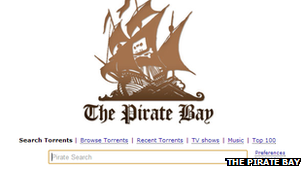Ireland orders firms to ban access to The Pirate Bay
- Published

Ireland joins a growing list of countries to ban some of their ISPs providing access to The Pirate Bay
Six internet service providers (ISPs) in the Republic of Ireland have been told to block access to The Pirate Bay's file-sharing website.
The court order follows complaints from four music labels that the site was helping spread copyrighted content.
The ISPs have been given until mid-July to implement the ban. It is Ireland's first such move.
It follows similar restrictions placed on the site in the UK, the Netherlands, Italy, Denmark and Belgium.
The High Court order applies to Vodafone, Digiweb, UPC, Imagine, Telefonica O2 and Hutchison 3G.
A seventh ISP in the country, Eircom, has voluntarily banned The Pirate Bay since 2009.
EMI, Sony, Universal and Warner Music had alleged that as many as 200,000 people in Ireland made use of the site, causing them to lose about 20m euros (£17m) a year.
"The Irish Recorded Music Association is very pleased at the decision of the High Court, which blocks access by all ISPs to the notorious Pirate Bay website," the organisation's director general, Dick Doyle, told the BBC.
"It is estimated that 8% of all internet users in Ireland accessed the website on a monthly basis.
"The template from this decision will now be used to seek further orders blocking access to other websites and cyber-lockers predominately involved in making available infringing copyrights."
Ireland signed into law last year an EU regulation, external designed to make it easier for copyright owners to seek injunctions against ISPs and other intermediaries providing access to pirated materials.
When the UK imposed a similar ban in 2012, several proxy sites - which act as a middle man to retrieve blocked content - were created, allowing users to circumvent the restriction.
Music industry organisation the BPI was subsequently given the right to add the proxies to the list of sites the ISPs had to block, but it effectively set up a situation where as soon as one was taken down another was set up to take its place.
"I expect that the music labels have learned from the past experiences in other countries where the blockades are massively circumvented through proxy sites, and that they have requested these to be blocked in Ireland as well," said Torrentfreak's editor Ernesto Van Der Sar.
"But even when that's the case then there will always be workarounds. People can use a VPN [virtual private network] service for example, and there are still hundreds of proxy sites that are not covered.
"That said, it does become harder to access The Pirate Bay and that is the music label's ultimate goal."
- Published7 June 2013
- Published6 June 2013
- Published21 May 2013